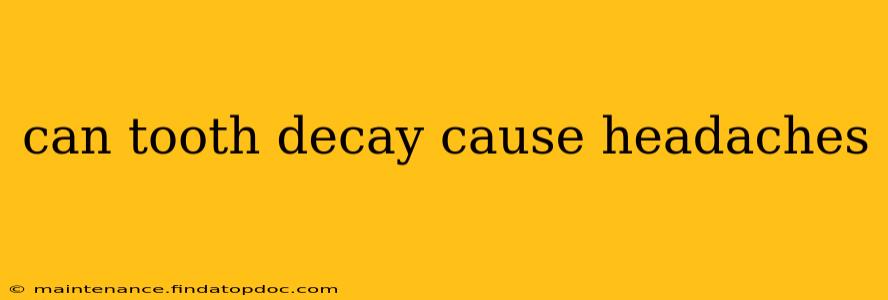Can Tooth Decay Cause Headaches? The Surprising Connection
Yes, tooth decay can indeed cause headaches, and it's often more common than you might think. While not every headache stems from a dental issue, a significant number are linked to problems within the mouth, especially untreated cavities and infections. Understanding this connection is crucial for effective headache management and overall oral health.
How Does Tooth Decay Lead to Headaches?
The connection between tooth decay and headaches isn't always straightforward, but it's primarily due to the pain and inflammation caused by the decay itself. Several mechanisms can contribute:
-
Infected Pulp: Severe tooth decay can infect the dental pulp, the soft tissue inside the tooth containing nerves and blood vessels. This infection causes intense pain, which can radiate to other areas, including the head, leading to headaches, often described as throbbing or pulsating.
-
Abscess Formation: An untreated infection can lead to an abscess, a pocket of pus that forms at the root of the tooth. This abscess puts pressure on the surrounding tissues and nerves, resulting in significant pain that can trigger headaches. The pressure can even spread to the sinuses, causing sinus headaches.
-
Temporomandibular Joint (TMJ) Dysfunction: Severe tooth decay and the resulting pain can lead to clenching or grinding of the teeth (bruxism). This can strain the muscles and joints of the jaw, causing TMJ dysfunction, which is a common source of headaches. TMJ headaches are often characterized by pain in the jaw, temples, and forehead.
What Kind of Headaches Can Tooth Decay Cause?
The type of headache associated with tooth decay can vary, but it’s often:
-
Tension headaches: These are usually mild to moderate pain, often described as a tight band around the head. Dental problems can exacerbate underlying tension headaches, making them more frequent or severe.
-
Sinus headaches: Because the roots of upper teeth are close to the sinuses, infections from decayed teeth can spread and cause sinus inflammation, leading to sinus headaches.
-
Migraines: While less direct, some individuals report that severe dental pain can trigger migraine attacks in susceptible individuals.
What if I Have a Toothache and a Headache?
If you're experiencing both a toothache and a headache, it's crucial to seek professional dental care immediately. Ignoring the toothache could allow the infection to worsen, potentially leading to more severe complications and more persistent headaches. Your dentist can diagnose the cause of your pain and recommend the appropriate treatment.
How Can I Prevent Tooth Decay-Related Headaches?
The best way to prevent headaches caused by tooth decay is to maintain excellent oral hygiene:
-
Brush twice a day: Use fluoride toothpaste and a soft-bristled toothbrush.
-
Floss daily: This removes food particles and plaque from between your teeth.
-
Regular dental checkups: Visit your dentist for regular checkups and cleanings to detect and treat decay early.
Can a Dentist Treat Tooth Decay-Related Headaches?
Yes. A dentist can diagnose and treat the underlying tooth decay, which often resolves the associated headaches. Treatments might include fillings, root canals, extractions, or antibiotics, depending on the severity of the decay and infection.
Are there other causes of headaches besides tooth decay?
Absolutely. Many factors can cause headaches, including stress, dehydration, lack of sleep, caffeine withdrawal, and various medical conditions. If you are experiencing frequent or severe headaches, it's important to consult a doctor or neurologist to rule out other possible causes.
By understanding the connection between tooth decay and headaches, you can take proactive steps to maintain good oral health and prevent this type of headache from developing. Remember, early detection and treatment of dental problems are key to preventing more serious issues and persistent pain.
